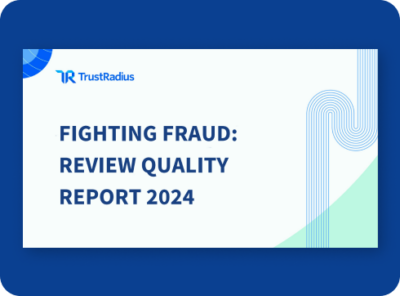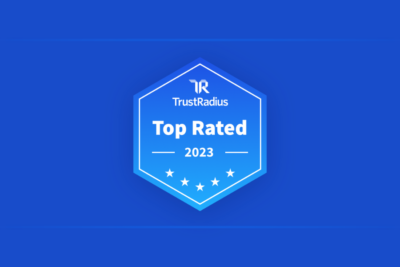
Vinay Bhagat
August 30, 2015
Mattersight’s CMO Shares the Impact of User Reviews
 Jason Wesbecher is the CMO of Mattersight, a suite of innovative personality-based software applications that can analyze and predict customer behavior based on the language exchanged during service and sales interactions. We discussed why he decided to build a user review program, why he partnered with TrustRadius, the impact that it’s already had on his company and key lessons learned.
Jason Wesbecher is the CMO of Mattersight, a suite of innovative personality-based software applications that can analyze and predict customer behavior based on the language exchanged during service and sales interactions. We discussed why he decided to build a user review program, why he partnered with TrustRadius, the impact that it’s already had on his company and key lessons learned.Tell our readers a little about Mattersight
Mattersight’s mission is to help brands have more effortless, satisfying phone calls with their consumers. We leverage personality based applications to boost customer experience. We match callers to agents and coach call center employees to respond to personalities when they hear them on the phone. Last year our tools facilitated 100s of millions of more successful phone calls.
What led you to embrace user reviews?
I came to the conclusion that one of the things that we lack in the marketplace is social proof. Customer press releases and Gartner mentions are really only part of delivering on social proof. In fact, they are an increasingly smaller part of achieving that mission. Ratings and reviews are a very meaningful part of delivering social proof to prospective buyers. To use a B2C analogy, what’s more important, a restaurant review in the newspaper or Yelp reviews? In most cases, it’s the Yelp reviews.
How do you define social proof?
I believe that social proof is creating awareness and trust, and using that awareness and trust to compel an action on the part of the prospective customer.
What criteria were important to you when embarking on a user review program?
Making it as friendly to the prospective viewer as possible. It’s got to be massively transparent, it cannot be manipulated by the vendor. It has to be truly independent. I cannot create trust with my prospective customer if that customer has any possible suspicion that I am manipulating these reviews, adding fake reviews. It has to be completely above board at every step of the way and we have to be transparent with our actions. Having a bad review live side by side with good reviews is more important to us as it indicates that this is a source of trusted content.
How did you select the sample of customers to solicit?
It was a broad sample. Our client services teams nominated a set of accounts that have either maturity with us as a business partner or who have achieved some compelling ROI through their partnership with us. Each customer has had a sufficient history with us informed by good and bad experiences.
So you didn’t just target customer advocates?
We are in our infancy as a marketing organization. I am not sure we know who our advocates are. We sell true enterprise software. It’s sold to a procurement organization for $100ks if not $millions. It’s a complex piece of enterprise technology. It’s not easy to get to users individually. You have to go through the economic buyer. They are a layer of abstraction with your potential advocates. Step one for building an advocacy program is TrustRadius. Inviting customers to review us is a way for us to identify advocates.
Moreover, no software is perfect. I think you’re better off setting the expectations with prospects up front as to what things they’ll love and what things need work, so they’re not blindsided. We’re aware of our issues. I’d rather prospective customers know them and not be surprised, as otherwise, that just creates a whole ugly set of outcomes down the road. I believe the prospective buyer is smarter than most vendors give them credit. If you only ask advocates to review you, they will see through it.
Was there trepidation? If so, how did you overcome it?
Yes, there was extreme fear. We originally launched the program with the intention of us driving the reviews ourselves. However, the organization was so unsupportive, it didn’t work. We decided to partner with TrustRadius to drive reviews. All 33 of our reviews came from the TrustRadius Review and Reference Acceleration program. As soon as the organization started to see the value these reviews could bring, they became a lot more supportive.
What’s the business impact you’re starting to see?
There are two immediately quantifiable sources of value:
1) References
When prospective customers ask for references, we can accelerate that very critical part of the sales cycle. We don’t have to cajole someone to get on the phone. We can send them to a website with 33 living, breathing, authentic reviews which are probably more beneficial than a single call.
2) Product feedback
Our engineering and product team have access to direct user feedback. Whenever reviews come in, they correlate the feedback with their product roadmap to see if priorities need to change.
Then there’s also the qualitative value of having the confidence to stand up in front of a group of investors or at a conference and say, you can read everything you need to know about our customer relationships right here. That gives us confidence and indicates to the audience that we’re being authentic.
What advice would you give to others?
Having a couple of negative reviews in the mix is vastly superior to no reviews at all. Again to use the B2C analogy of restaurants, no one wants to eat at the un-reviewed restaurant. That’s insane.
What if they are fearful of comparison?
Then they are thinking about it from the wrong lens. The customer is already making comparisons. They expect reviews. If they have confidence in their offering, they need to let the users sell the benefits for them. Nobody sells your product or value proposition better than someone who doesn’t have your business card. That’s very true in the TrustRadius community. You have a bunch of people who are very transparent. Even when something is not working, it doesn’t mean that vendor is bad, it means they’ve had some hiccups along the way as with any software product. Microsoft Outlook is one of the most used software products in the world and it crashes on me several times a week, but it’s indispensable to my productivity and I deal with those quirks.
How are your sales team using the reviews?
We feature highlights from a few reviews in our sales presentation (see slide below). We highlight the LinkedIn photo and title as we think that’s a really important part of a TrustRadius review. We encourage the prospective customer to go to read our reviews on TrustRadius to learn more.

How would you contrast user reviews to case studies?
Without doubt it’s been much easier to get brands to go on the record on TrustRadius versus to publish case studies [Mattersight has been successful in getting key brands like Allstate and Hilton to go on the record via TrustRadius]. It would have taken 3 years to get to 33 case studies!
Anything else that you would like to share?
Having the ability to respond to reviews is really important. It shows the viewer that when there is a particularly negative review that the vendor is engaged and cares. We have one two star review. We responded to it. It’s the only one we’ve responded to so far as it was bad. We laid out all the steps that we’re taking and we thanked them and encouraged them to keep keeping us honest.




